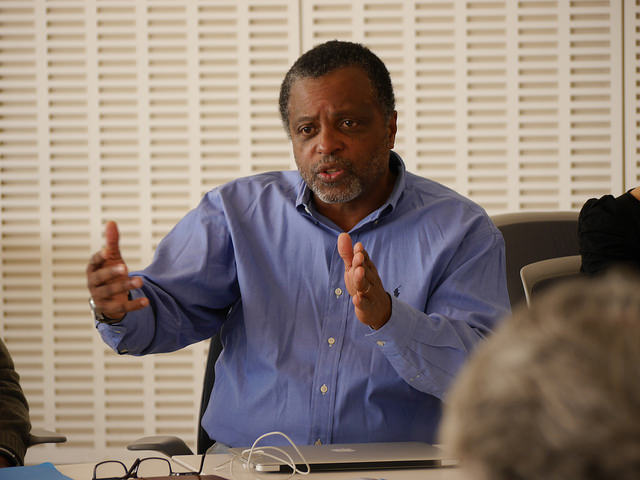I recently attended a conference of academics and activists that began a conversation on a “Next System economy,” how some examples already are developed or developing, and how our collaboration can lead to future research and application on the building of “alliances between issues in order to put a real menu of alternatives on the table that counters the exploitation, extraction, and other ills induced by unregulated capitalism.”
Local Procurement, One way to Democratize Capitalism
This post is part of a series written by a group of Masters in City Planning Students who sat in on Opening up the System Question: A Strategy Workshop convened by the Democracy Collaborative’s Next System Project and MIT CoLab. The workshop brought together a group of engaged scholars and activists to discuss the question of how we open up a much-needed national conversation on systemic change in the United States.
What does the “Next System” look like? Many elements of a Next System economy already exist, and many of the attendees of this conference are engaging in fantastic work building projects within their communities that democratize capital, labor, and democracy itself. The conference was an exploration of the kinds of strategies for crafting a research agenda and a media messaging strategy that could help translate these successful projects into scalable movements. The fundamental question here was: how can academics and activists interested in confronting climate change, in providing economic opportunity for all, or in establishing a deeper democracy build alliances between issues in order to put a real menu of alternatives on the table that counters the exploitation, extraction, and other ills induced by unregulated capitalism?
A wide array of ideas came out of the conversations, but one of the most immediate – and while not necessarily low-hanging fruit, maybe at least fruit within reach – is the project of local procurement. Leveraging anchor institutions to direct their purchasing power to the surrounding communities means more jobs, more local wealth, and often more environmentally sustainable practices. Renewable energy and green infrastructure are interventions that pay for themselves, and require significant labor and expertise that can be best handled by local contractors. In a number of cities, healthcare or education institutions are the main game(s) in town. Shifting their existing spending to the local economy can reshape the economic landscape. While the frequently cited Evergreen Co-ops have achieved some successes in Cleveland, David Orr, a renowned academic of Environmental Studies and Politics, is working to expand towards a region wide import substitution project in Ohio – shifting $1 billion to the other side of the ledger.
Beyond creating jobs, local procurement also provides opportunities for democratizing capitalism by moving towards worker-owned cooperatives. Transitioning from a traditional business model in a potentially less-tested market can be challenging. For instance, Evergreen’s greenhouses faced significant human resource challenges in the early years. Building in training elements and developing human capital from experienced organizations, and providing widely-available business literacy courses (either through high schools, community colleges, or massive open online courses) can help socially-driven initiatives be viable in a business environment. Increased ownership can also be established through looser organizational models that are created through online platforms. Online peer-to-peer exchange platforms, which are scaling rapidly in other contexts, are worthwhile examples to consider. This platform-based model has been successful with home health care aides, with a worker-owned system allowing wealth to accrue to laborers rather than the coordinating agency.
The conference comes at a crisis moment. Almost daily, protestors are coordinating marches in the streets across the country decrying police killings of unarmed black men. Aggressive police tactics, racial profiling and mass incarceration are not disconnected from economic conditions. As Phil Thompson points out, demands for full employment and economic justice were central to the Civil Rights movement.
Leaving the conference on Saturday to join the Millions March, aimed at continuing the struggle against police violence and for justice, brought a visceral sense of immediacy, urgency, and hope. How the collective energy and frustration of this moment can be channeled into productive demands, strategically phased, that lead to a reimagining of the country’s economy is maybe the most critical question for the movement’s leaders.
Post by Jon Springfield. Photo Credit: Democracy Collaborative.
Phil Thompson connecting ongoing protest against police violence to demands for economic justice.


